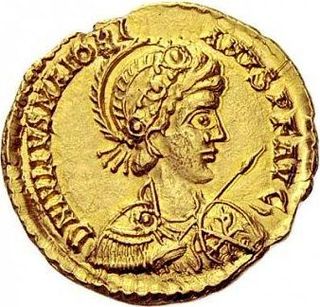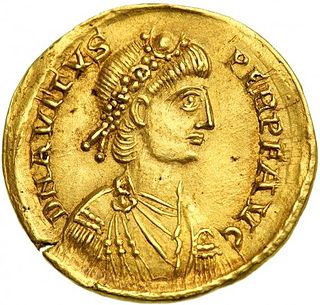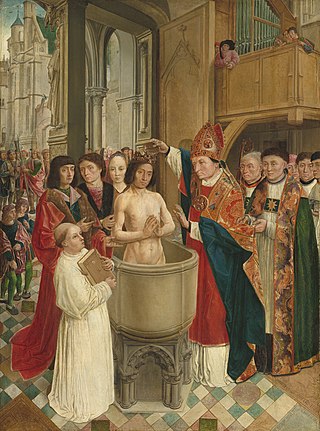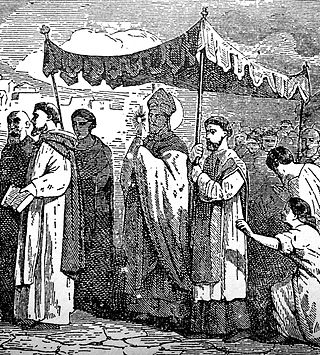See also
Name list
This page or section lists people that share the same given name. If an internal link led you here, you may wish to change that link to point directly to the intended article.
Sidonius is a Roman cognomen literally meaning "man from Sidon" Later it was used as a given name, after the saint Sidonius Apollinaris.
Notable people with this name include:

Majorian, was the Western Roman emperor from 457 to 461. A prominent commander in the Western military, Majorian deposed Avitus in 457 with the aid of his ally Ricimer. Possessing little more than Italy, Dalmatia, as well as some territory in Hispania and northern Gaul, Majorian campaigned rigorously for three years against the Empire's enemies. In 461, he was murdered at Dertona in a conspiracy, and his successors until the Fall of the Empire in 476 were puppets either of barbarian generals or the Eastern Roman court.

Eparchius Avitus was Roman emperor of the West from July 455 to October 456. He was a senator of Gallic extraction and a high-ranking officer both in the civil and military administration, as well as Bishop of Piacenza.

Gaius Sollius Modestus Apollinaris Sidonius, better known as Sidonius Apollinaris, was a poet, diplomat, and bishop. Born into the Gallo-Roman aristocracy, he was son-in-law to Emperor Avitus and was appointed Urban prefect of Rome by Emperor Anthemius in 468. In 469 he was appointed Bishop of Clermont and he led the defence of the city from Euric, King of the Visigoths, from 473 to 475. He retained his position as bishop after the city's conquest, until his death in the 480s. He is venerated as a saint in the Catholic church, the Orthodox Church, and the True Orthodox Church, with his feast day on 21 August.
Riothamus was a Romano-British military leader, who was active circa AD 470. He fought against the Goths in alliance with the declining Western Roman Empire. He is called "King of the Britons" by the 6th-century historian Jordanes, but the extent of his realm is unclear. Some Arthurian scholars identify Riothamus as one of the possible sources of the legendary King Arthur.

Remigius was the Bishop of Reims and "Apostle of the Franks". On 25 December 496, he baptised Clovis I, King of the Franks. The baptism, leading to about 3000 additional converts, was an important event in the Christianization of the Franks. Because of Clovis's efforts, a large number of churches were established in the formerly pagan lands of the Frankish empire, establishing a distinct Catholic variety of Christianity for the first time in Germanic lands, most of whom had been converted to Arian Christianity.

Mamertus was the bishop of Vienne in Gaul, venerated as a saint. His primary contribution to ecclesiastical practice was the introduction of litanies prior to Ascension Day as an intercession against earthquakes and other disasters, leading to "Rogation Days." His feast day is the first of the Ice Saints.

Eucherius was a high-born and high-ranking ecclesiastic in the Christian church in Roman Gaul. He is remembered for his letters advocating extreme self-abnegation. From 439, he served as Archbishop of Lyon, and Henry Wace ranked him "the most distinguished occupant of that see" after Irenaeus. He is venerated as a saint within the Catholic Church and Eastern Orthodox Church.
Apollinaris may refer to:
Saint Viventiolus was the Archbishop of Lyon 514–523. Later canonized and venerated as a saint within the Catholic Church, Archdiocese of Lyon, France his feast Day is July 12. He is recognised in the Orthodox Church and the True Orthodox Church, including amongst the Tikhonites, as a pre-Great Schism Western Saint.
Decimus Rusticus of Treves and Lyon (Lugdunum) was a Master of the Offices and the praetorian prefect of Gaul between 409 and 410 or 413. He was one of those responsible for the withdrawal from Britannia.
Tonantius Ferreolus was the praetorian prefect of Gaul from 451.
Flavius Probus, a Roman Senator and a v. nob. of Narbonne, then Narbo, was a man of literary taste and precocious ability. His father was Flavius Magnus, Consul of Rome in 460. He was a friend of Sidonius Apollinaris from their schooldays.
Modestus was a Roman cognomen. It may refer to:
Auspicius of Toul was a 5th-century bishop of Toul, the fifth of those recorded, and a saint of the Roman Catholic church. He was also a poet, known for iambic verse based on stress ; this was an innovation of his time. A verse letter of his from around 470 to Arbogast, count of Trier, survives.
Agroecius or Agroetius was an ancient Gaul who was bishop of Sens. He was also a grammarian, and the author of an extant work in Latin, De Orthographia et Differentia Sermonis, intended as a supplement to a work on the same subject by Flavius Caper. It was composed around 450, and dedicated to the bishop Eucherius of Lyon, who apparently had earlier given Agroecius a copy of Caper's work. He is supposed to have lived in the middle of the 5th century. His work is reprinted in Putschius' Grammaticae Latinae Auctores Antiqui, pp. 2266–2275.

Saint Quintian was a bishop of Rodez and a bishop of Clermont-Ferrand (Arvernes) in the sixth century, and participated in the Councils of Agde (508) and Orleans (511).

Saint Euphronius of Autun was a bishop of Autun between 450 and 490. According to Dom Basil Watkins OSB, Euphronius "was one of the greatest bishops of Gaul..."in the 5th century.

The Battle of Vicus Helena was a clash between Salian Franks led by Chlodio and Roman soldiers commanded by general Flavius Aetius; the latter were victorious. It is attested in a limited number of late Roman and early Medieval sources, and reportedly occurred in or around the year 448 in the unidentified place of Vicus Helena somewhere in the Civitas Atrebatium, modern Artois.
Sidónio is a masculine given name which may refer to: